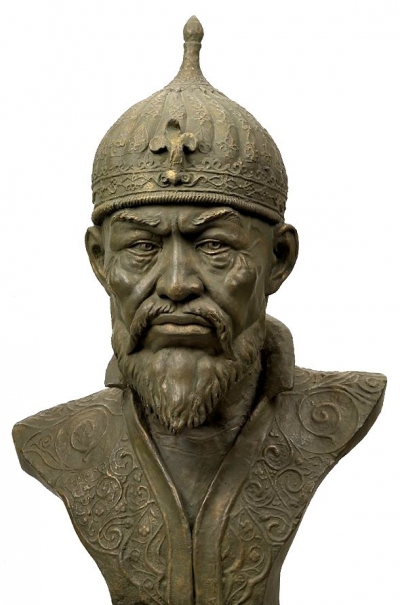The Kingdom of Georgia, a Christian kingdom in the Caucasus, was subjected, between 1386 and 1403, to several disastrous invasions by the armies of Turco-Mongol conqueror Timur, whose vast empire stretched, at its greatest extent, from Central Asia into Anatolia. These conflicts were intimately linked with the wars between Timur (Tamerlane) and Tokhtamysh, the last khan of the Golden Horde and Timur's major rival for control over the Islamic world. Timur officially proclaimed his invasions to be jihad against the region's non-Muslims. Although he was able to invade parts of Georgia, he was never able to make the country Muslim and even recognized Georgia as a Christian state.
In the first of eight invasions, Timur sacked Georgia's capital, Tbilisi, and captured the king Bagrat V in 1386. Georgian resistance prompted a renewed attack by the Turco-Mongol armies. Bagrat's son and successor, George VII, put up a stiff resistance and had to spend much of his reign (13951405) fighting the Timurid invasions. Timur personally led most of these raids to subdue the recalcitrant Georgian monarch. He was not able to establish a firm control over Georgia. By the time George VII was forced to accept Timur's terms of peace and agree to pay tribute, he was a master of little more than "gutted towns, ravaged countryside and a shattered monarchy."
Timur (Chagatay: تيمور Temür, lit. 'Iron'; 9 April 1336 – 17–19 February 1405), later Timūr Gurkānī (Chagatay: تيمور کورگن Temür Küregen), was a Turco-Mongol conqueror who founded the Timurid Empire in and around modern-day Afghanistan, Iran and Central Asia, becoming the first ruler of the Timurid dynasty. As an undefeated commander, he is widely regarded as one of the greatest military leaders and tacticians in history. Timur is also considered a great patron of art and architecture as he interacted with intellectuals such as Ibn Khaldun and Hafiz-i Abru and his reign introduced the Timurid Renaissance.: 341–342 Born into the Barlas confederation in Transoxiana (in modern-day Uzbekistan) on 9 April 1336, Timur gained control of the western Chagatai Khanate by 1370. From that base, he led military campaigns across Western, South and Central Asia, the Caucasus, and Southern Russia, defeating in the process the Khans of the Golden Horde, the Mamluks of Egypt and Syria, the emerging Ottoman Empire, and the late Delhi Sultanate of India and emerging as the most powerful ruler in the Islamic World. From these conquests, he founded the Timurid Empire, but this empire fragmented shortly after his death.
Timur was the last of the great nomadic conquerors of the Eurasian Steppe, and his empire set the stage for the rise of the more structured and lasting Islamic gunpowder empires in the 16th and 17th centuries. Timur was of both Turkic and Mongol descent, and, while unlikely a direct descendant on either side, he shared a common ancestor with Genghis Khan on his father's side, though some authors have suggested his mother may have been a descendant of Khan. He clearly sought to invoke the legacy of the latter's conquests during his lifetime. Timur envisioned the restoration of the Mongol Empire of Genghis Khan (died 1227) and according to Gérard Chaliand, saw himself as Genghis Khan's heir.According to Beatrice Forbes Manz, "in his formal correspondence Temur continued throughout his life to portray himself as the restorer of Chinggisid rights. He justified his Iranian, Mamluk, and Ottoman campaigns as a re-imposition of legitimate Mongol control over lands taken by usurpers." To legitimize his conquests, Timur relied on Islamic symbols and language, referred to himself as the "Sword of Islam". He was a patron of educational and religious institutions. He converted nearly all the Borjigin leaders to Islam during his lifetime. Timur decisively defeated the Christian Knights Hospitaller at the Siege of Smyrna, styling himself a ghazi.: 91 By the end of his reign, Timur had gained complete control over all the remnants of the Chagatai Khanate, the Ilkhanate, and the Golden Horde, and even attempted to restore the Yuan dynasty in China.
Timur's armies were inclusively multi-ethnic and were feared throughout Asia, Africa, and Europe, sizable parts of which his campaigns laid waste. Scholars estimate that his military campaigns caused the deaths of 17 million people, amounting to about 5% of the world population at the time. Of all the areas he conquered, Khwarazm suffered the most from his expeditions, as it rose several times against him.Timur was the grandfather of the Timurid sultan, astronomer and mathematician Ulugh Beg, who ruled Central Asia from 1411 to 1449, and the great-great-great-grandfather of Babur (1483–1530), founder of the Mughal Empire, which then ruled almost all of the Indian subcontinent.

1386Nov, 21
Timur of Samarkand captures and sacks the Georgian capital of Tbilisi, taking King Bagrat V of Georgia captive.
Choose Another Date
Events on 1386
- 9May
Treaty of Windsor (1386)
England and Portugal formally ratify their alliance with the signing of the Treaty of Windsor, making it the oldest diplomatic alliance in the world which is still in force. - 9Jul
Battle of Sempach
The Old Swiss Confederacy makes great strides in establishing control over its territory by soundly defeating the Archduchy of Austria in the Battle of Sempach. - 21Nov
Timur's invasions of Georgia
Timur of Samarkand captures and sacks the Georgian capital of Tbilisi, taking King Bagrat V of Georgia captive.

 English
English  español
español  français
français  português
português  русский
русский  العربية
العربية  简体中文
简体中文 